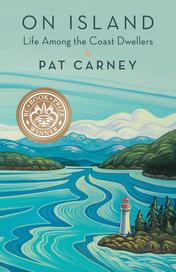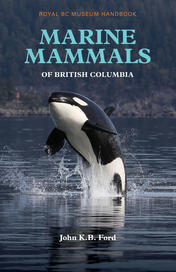BC Books on BC Ferries 2018
Created by ABPBC on June 27, 2018
On Island
#1 BC bestselling book of 2017
Winner of the 2018 BC Book Prizes' Bill Duthie Booksellers Choice Award
A collection of stories chronicling the characters and dramas that capture life in small coastal communities.
In this story collection, Pat Carney follows the rhythms of day-to-day life in coastal BC. Featuring a revolving cast of characters—the newly retired couple, the church warden, the musician, the small-town girl with big city dreams—Carney’s keen observations of the personalities and …

Marine Mammals of British Columbia
Dr. John Ford presents the latest information on 31 species of marine mammals that live in or visit BC waters: 25 whales, dolphins and porpoises, 5 seals and sea lions, and the sea otter. He describes each species and summarizes its distribution, habitat, social organization, feeding habits, conservation status and much more. Marine Mammals of British Columbia includes maps of sightings, and pointers on where to find each species in BC waters. It also contains hundreds of colour photographs and …

Beach Baby
A gentle, poetic lullaby for baby, filled with memories from a perfect day playing on the beach.
Castles, sand dollars, seals peering out of the waves and the beat of the ocean become sweet reminders of all the magical things that await baby tomorrow. A lyrical celebration of natural beauty and a soft, reassuring reminder for little ones being tucked into bed that fun and adventure will return with a new day.
Elly MacKay’s paper-theater worlds are a delight to behold and infuse the story with a …
Everything will be here when you wake...

105 Hikes in and Around Southwestern British Columbia
The all-new, expanded follow-up to southwestern British Columbia’s best-selling hiking guidebook—now featuring trails on the islands and northern Washington.
For nearly fifty years, David and Mary Macaree’s iconic 103 Hikes in Southwestern British Columbia has been the province’s most popular and most trusted hiking guide, with more than 100,000 copies sold to date. Author Stephen Hui carries on the Macarees’ legacy in 105 Hikes in and around Southwestern British Columbia—an all-new, …

Campfire Stories of Western Canada
A fun-for-all-ages collection of over thirty spooky stories in settings across Western Canada.
When friends and family gather around a campfire, good times and scary stories are sure to follow. In Campfire Stories of Western Canada, Barbara Smith, the author of twenty books of true ghost stories from across Canada, presents a creepy collection of tales tailor-made for your family’s next foray into the British Columbia or Alberta wilderness. Suitable for campers aged eight to eighty, these tales …

Wild Fierce Life
Unflinching and heart-stopping stories that evoke a respect for nature both in its fragility and its power. Wild Fierce Life is a heart-stopping collection of true stories from the Pacific Coast that build a vivid portrait of life on the continental edge and one woman's evolving place within it. Author Joanna Streetly arrived on the west coast of Vancouver Island when she was nineteen, and soon adapted to the challenges of working on boats of all sorts, guiding multi-day wilderness kayak trips a …

They Called Me Number One
BC Book Prize, Non-Fiction, Bev Sellars, They Called Me Number One (Finalist)
Burt Award for First Nations, Métis, and Inuit Literature: Bev Sellars, They Called Me Number One (Third Prize winner)
Like thousands of Aboriginal children in Canada, and elsewhere in the colonized world, Xatsu'll chief Bev Sellars spent part of her childhood as a student in a church-run residential school.
These institutions endeavored to "civilize" Native children through Christian teachings; forced separation from f …
Introduction
I was seventeen years old; desperate to escape my misery and all I could think of was to die.
I was so young but my life’s experiences had made me feel so worthless. All those years of abuse and putdowns finally caught up to me that night. I was so tired of trying to fit in somewhere, anywhere. A silly incident was the deciding factor. If anything was going to make me take my life, it should have been worse things that had happened in the past, yet that is all it took. At the time, it did not seem so little. That moment meant life or death, and I chose death. There did not seem to be any point to living.
I had taken my Mom’s bottle of sleeping pills away from her earlier that day because she had been drinking and had talked about taking her life. As unhappy as Mom's life was, I still thought she had reasons to live. Now, there I was holding the pills in my hand. I threw them in my mouth and swallowed easily. I lay down in the bedroom and waited to go to sleep. I did not think about people who were worse off than I was. I did not think about the family and friends I would hurt. I just thought about how lost and lonely I felt and how desperately I wanted out of this world, a world that seemed to offer only intense unhappiness. I did not have to wait long before I felt myself going to sleep …
I started writing this book in the early 1990s when our communities first started to explore and deal with the “aftermath” of the Indian residential schools. A close relative heard that I was writing a book and said to me angrily, “I heard you are writing a book. Boy, you better not be writing anything about me!” This reaction changed my mind about making my story public, but I continued putting my thoughts and memories on paper. In 2004 I decided to finish the book, even if it turned out to be only an historical record for my family.
I asked myself, “Is it possible to make other people feel what I once felt and understand the message I am trying to convey? Is it possible to make others realize the damage they are doing to themselves and their loved ones? Is it possible to help others by writing of my experiences, or will it only create tension with my loved ones who have been a part of those experiences? Should my memories stay just memories?”
I have concluded that I had to write this book and share with those who I know are suffering the same experiences as me. In speaking with others who went to the residential schools in other areas of Canada I am amazed at how similar our stories are about the treatment of the children. It is as if the various churches running the schools were all in the same training program on how to run these schools.
My restricted view of the world and the oppressive conditions under which I lived were not the only options for me, although my experiences until then did not reveal otherwise. In writing the book, I have realized that I am still disassembling the restrictive world in which I once lived.
WHAT PAIN HAVE YOU SUFFERED?
In the early 1990s, I went into the local shopping mall in Williams Lake, British Columbia. I noticed a couple of women who were both at St. Joseph’s Mission while I was there. I went over to say hello and our conversation got around to my speaking out about the residential schools. One of the women said to me, “Why do you speak on residential schools? What pain have you suffered in your life that qualifies you to speak on the schools?” I was surprised at her question. I do not remember my response.
How do you measure pain? Some students looked forward to going back to the mission because their homes were so chaotic from all the alcohol in their communities. Unfortunately, some kids did not have a home to go to during our holidays. The woman who asked me the question was one of those whose home was completely broken because of alcoholism. Does that make her suffering more than mine? Or was my pain more because I knew there was something better at home for me than the life and abuses we suffered at the schools? Does the fact that I chose not to become addicted to alcohol or drugs disqualify me from suffering? Or, was my suffering more because I did not live my life in a fog that alcohol and drugs provided? If I chose to live through it, deal with it, feel the full extent of the pain and allow myself to grow emotionally and mentally, does that lessen my suffering?
Others in different countries have been persecuted. The Jewish peoples, the people in Rwanda and Bosnia, the Black people in the United States and others have atrocious stories to tell. Aboriginal people in Canada have a story to tell as well, a story of which most non-Aboriginal people in Canada are unaware. All of this happened in a country that proudly boasts as being one of the best places in the world to live; a supposedly democratic country where the freedoms and cultures of all are protected and respected. It is the greatest place to live for anyone, except for the original inhabitants of this land, the Aboriginal people.
I am angry about the way Aboriginal people have been and still are treated in Canada, but writing this book has allowed me to grow. I realize that complaining about the treatment of our people is justified, but doing something about it is more important. I found that I was not able to do anything to help my family, my community and Aboriginal people in general until I learned to help myself. Despite all of our experiences, it rests within each one of us to live up to our full potential.
I read somewhere that everyone is born with the potential for success, and it is only through life’s experiences that we develop or destroy that potential. For many Aboriginal people, our most vulnerable and impressionable years, our childhood years, were spent at residential schools. Our mental, emotional and spiritual growth was extremely stunted because of the way we were treated there.
You have to tell our story like it is, don’t hold back or make it seem like it wasn’t as bad as it actually was. People have to know and believe what happened to us. That’s what hurts … when people don’t believe what happened.
That is what Charlie Gilbert from the Williams Lake Indian Band (a.k.a. Sugar Cane) said to me when I started speaking out about the residential schools and the damage done to our people. I cannot tell everyone’s story. Others have told me some horrific stories about things that happened at residential schools, including a few potential murders but they are not my stories to tell. I do not have any right to speak on behalf of other people but my personal experience has exposed me to the effects the residential schools and other non-Aboriginal institutions have had on our society and people. I do not speak on behalf of anyone else’s experience unless it crossed with mine, and then I tell the story only from my perspective. The residential school and non-Aboriginal institutions had a drastic effect on me, and I am eminently qualified to speak on that.

At Home in Nature
The compelling story of one family’s life among the rugged landscapes of British Columbia's Coast Mountains, converting youthful ideals, raw land and a passion for the outdoors into a practical off-grid homestead.
Rob Wood grew up in a village on the edge of the Yorkshire Moors, where he eventually developed a preoccupation with rock climbing. After studying architecture for five years at the Architectural Association School in London, England, he made his way to Montreal and ended up in Calgar …



